Unit 2 The universal language Grammar and usage(1) Ellipsis 课件(30张PPT)
文档属性
| 名称 | Unit 2 The universal language Grammar and usage(1) Ellipsis 课件(30张PPT) | 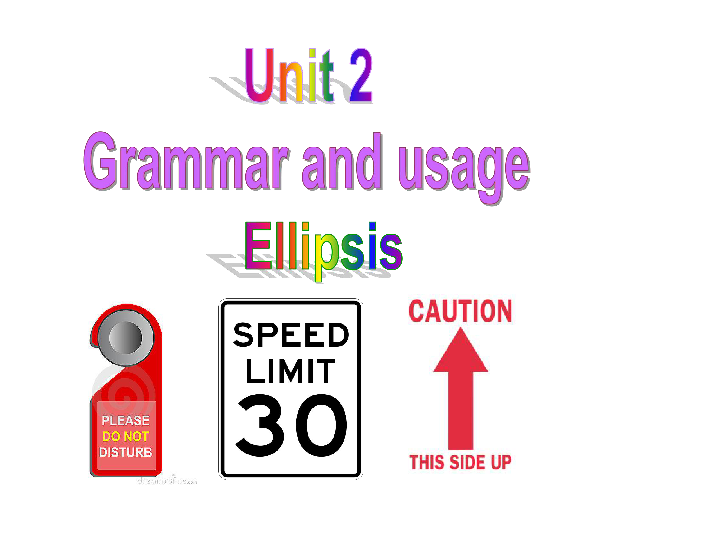 | |
| 格式 | zip | ||
| 文件大小 | 3.3MB | ||
| 资源类型 | 教案 | ||
| 版本资源 | 牛津译林版 | ||
| 科目 | 英语 | ||
| 更新时间 | 2020-02-28 22:05:55 | ||
图片预览

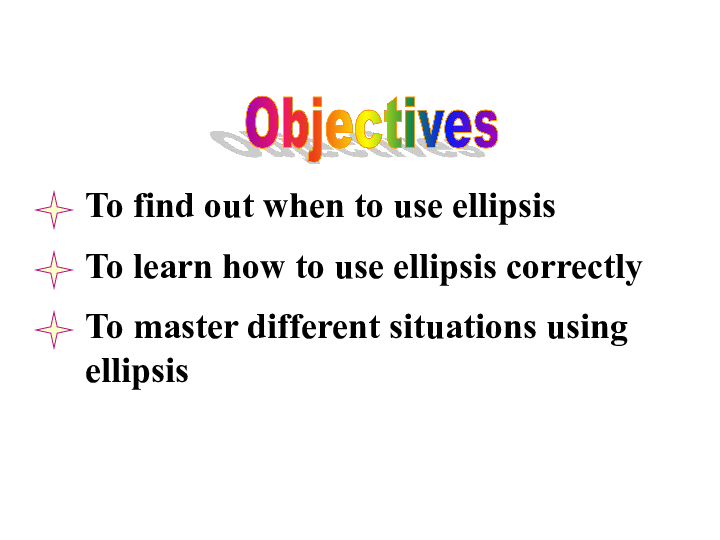
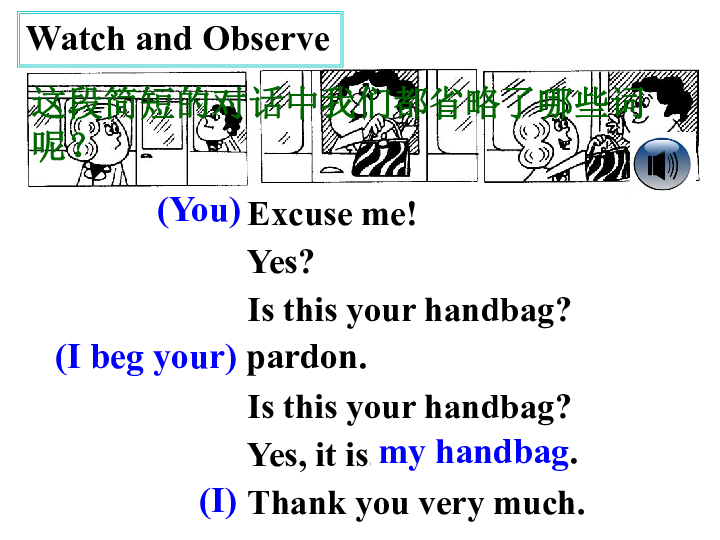
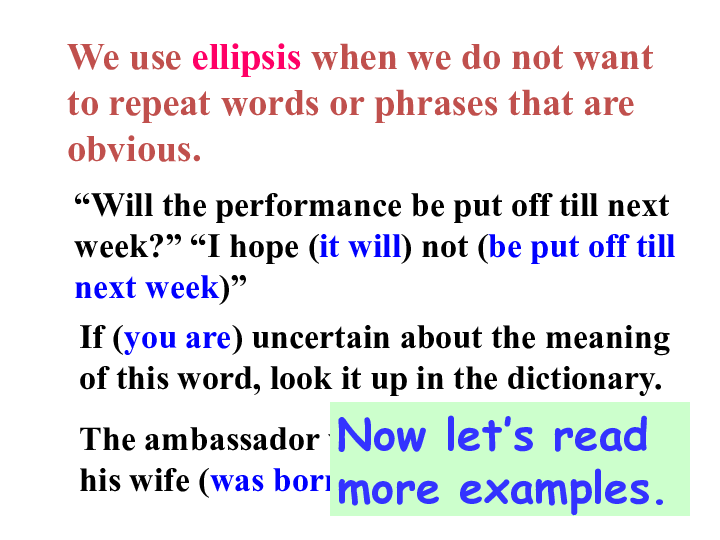
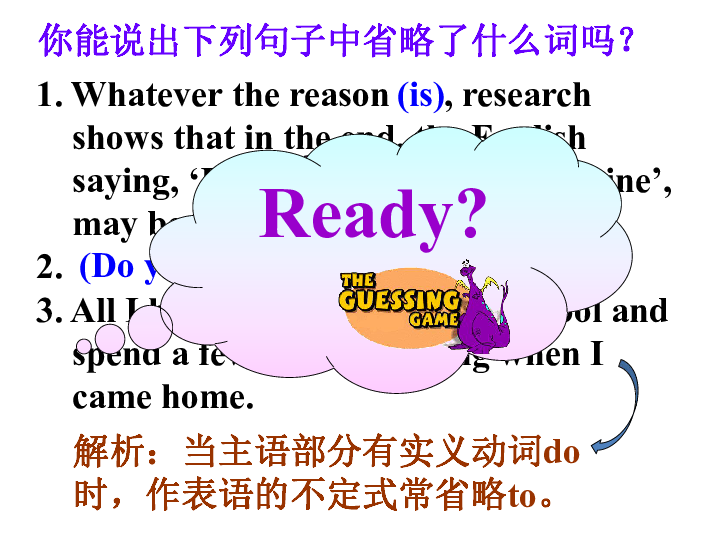
文档简介
(共30张PPT)
To find out when to use ellipsis
To learn how to use ellipsis correctly
To master different situations using ellipsis
Excuse me!
Yes?
Is this your handbag?
Pardon?
Is this your handbag?
Yes, it is.
Thank you very much.
(You)
(I beg your) pardon.
my handbag.
(I)
Watch and Observe
这段简短的对话中我们都省略了哪些词呢?
No smoking is
allowed here.
We use ellipsis when we do not want to repeat words or phrases that are obvious.
“Will the performance be put off till next week?” “I hope (it will) not (be put off till next week)”
If (you are) uncertain about the meaning of this word, look it up in the dictionary.
The ambassador was born in 1961, and his wife (was born) in 1964.
Now let’s read more examples.
1. Whatever the reason , research
shows that in the end, the English
saying, ‘Laughter is the best medicine’,
may be true after all.
2. mind if I sit down?
3. All I had to do was go to school and
spend a few hours studying when I
came home.
解析:当主语部分有实义动词do时,作表语的不定式常省略to。
(is)
(Do you)
(to)
你能说出下列句子中省略了什么词吗?
go
Ready?
4. They have not yet seen the effects of the
careless use of the environment like
many wealthy nations have
(seen the
effects of the careless use of the
environment).
In order to make the speeches or writings concise, we use ellipsis sometimes.
连接紧密,结构紧凑
强调重点,突出信息
5. The main drawbacks of the Internet
I will address today are that it
has too much information that has not
been evaluated for accuracy, and that it
is transforming the way
people spend their time.
6. For example, no matter what the
circumstances , when the phone
rings, everything stops so that the call
can be answered.
(that)
(that / in which)
(are)
1) (You) Come in, please.
2) (I) See you tomorrow.
3) (I) Thank you for your help.
4) (I) Beg your pardon.
简单句中的省略
1) (It) Sounds a good idea.
2) (Will you) Have a smoke?
3) (Would you like) Something to drink?
4) (You come) This way, please.
--- Do you know Miss Hu?
--- I don’t know (her).
可以省略宾语的全部;
Tom enjoys dancing, but Peter hates (dancing).
1) Don’t touch anything unless the
teacher tells you to (touch).
2) --- Are you a teacher?
--- No, but I want to be (a teacher).
3) --- He hasn’t finished the task.
--- Well, he ought to have (finished it).
可以省略作宾语的动词不定式, 只保留to, 但如果该宾语是动词be或完成形式, 则须在to后加上be或have。
--- Are you thirsty?
--- Yes, I am (thirsty).
2) His brother isn’t lazy.
Nor is his sister (lazy).
1) --- Are you feeling better now?
--- (I’m feeling) Better (now).
2) --- When did you read the novel?
--- (I read it) Long ago.
3) Let’s meet at the school gate as the
same as (we met) yesterday.
两个并列分句中,后一分句常省略与前一分句中相同的部分。
1) Mike said that he would come to school to see me the next day, but he didn’t (come to school to see me the next day).
2) Lin’s father was not at home, but his mother was (at home).
3) She was poor but (she was) honest.
1. signs/labels
No parking.
(No parking is allowed here.)
Quiet! (You should be quiet here.)
2. newspaper headlines
Turandot on stage.
(The opera Turandot is being performed
on stage.)
3. instructions
Do not bend!
(Do not bend this envelope.)
4. postcards/diaries
Best wishes.
(I give you my best wishes.)
5. notes
Opera OK, costumes great.
(The opera was OK, and the costumes
were great.)
1. She likes singing and she likes
dancing.
2. Is this the driver that you talked about
yesterday?
3. The man who is sitting by the window
is Mr. Smith.
4. He could not decide whether to buy
the car or not to buy the car.
5. When it is heated, the metal expands.
Change the sentences into elliptical sentences.
6. You can do it if you want to do it.
7. My father designed all these houses and
my father built all these houses.
8. He is the last person that I want to see.
9. He worked hard but his brother did not
work hard.
10. While he was reading the newspaper, grandpa nodded from time to time.
11. He went to the doctor because he had
to go to the doctor.
12. The reference books which were
ordered last month haven’t arrived yet.
13. We tested the depth of the water and
the temperature of the water.
14. Although he is very busy, he will do it
for us.
15. You may leave if you wish to leave.
Answers A
Jane: How did you feel taking part in Turandot?
Singer: It was a real opportunity for me to be cast. It had always been one of my strongest desires to have a part in Turandot.
Jane: How were you hired for the job?
Singer: Well, I’m a musical performer, but there was a short period when I was not working, and was just collecting unemployment benefits. One day, I saw a poster put up by the production company’s Personnel Department, saying they were looking for singers. I applied for the job, and they sent me an invitation to try out for a part in the chorus.
Jane: Was it difficult to try out?
Singer: Yes, it was difficult. They asked me to sing a tune, and at the time I had a sore throat, so I was afraid I wouldn’t get the job.
Jane: What did you like best about participating in Turandot?
Singer: The best part was visiting Beijing because the performance was staged in the Forbidden City. It was my first visit to Beijing.
Jane: Would you like to visit Beijing again?
Singer: Yes, I would like to visit Beijing again.
Jane: Well, it’s been fun talking to you. I thank you for your time.
Singer: You’re welcome.
Answers B
1 b 2 c 3 a 4 d 5 e
1 Bob James, a pop star, dies of drug
abuse.
2 This is the door to the stage.
3 The performance last night was not as
good as expected.
4 Please handle this with care.
5 Turandot was really a wonderful
performance, and the setting was also
fantastic.
Ellipsis is often used in imperative
sentences, _________________,
_________________ and in informal
English.
2. Ellipsis can be also used in some special
styles to save space and time, such as in
_____________, newspaper headlines,
___________, postcards or diaries and
______.
in short responses
in infinitive phrases
signs or labels
instructions
notes
1. Haven’t seen you for ages.
?2. Some more tea?
3. Sounds like a good idea.
I haven’t seen you for ages.
Would you like some more tea?
That/It sounds like a good idea.
Quiz I: Find out what have been left out.
4. Doesn’t matter.
5. Sorry to hear that.
It doesn’t matter.
I’m sorry to hear that.
6. Pity you couldn’t come.
7. This way, please.
It’s / What a pity you couldn’t come.
? Step / Come this way, please.
8. Terrible weather!
9. Joining us for a drink?
10. Going to the supermarket?
What terrible weather it is!
Are you joining us for a drink?
? Are you going to the supermarket?
1. 我的兄弟抽烟,而我不抽烟。
My brother smokes, but I don’t
(smoke).
Quiz II: Translate the sentences.
2. 一旦出版,这部小说将成为今年的 畅销书之一。
When published, the novel will become one of the best sellers of the year.
3. 过马路要小心。
When (you are) crossing the road, (you must) be careful.
4. 我只能按照别人告我的方法去做。
I can only do it (the way) as (I was) told to (do it in that way).
5. — 那袋子沉么? — 不很沉。
— Is that bag heavy? — (It’s) Not very (heavy).
Quiz III: Put brackets around the words that can
be left out. The first example is done for you.
(
)
(
)
(
)
(
)
(
)
(
)
(
)
(
)
(
)
(
)
(
)
(
)
(
)
1. Do parts C1 and C2 on P109 of the Workbook.
2. Preview Task on P26.
To find out when to use ellipsis
To learn how to use ellipsis correctly
To master different situations using ellipsis
Excuse me!
Yes?
Is this your handbag?
Pardon?
Is this your handbag?
Yes, it is.
Thank you very much.
(You)
(I beg your) pardon.
my handbag.
(I)
Watch and Observe
这段简短的对话中我们都省略了哪些词呢?
No smoking is
allowed here.
We use ellipsis when we do not want to repeat words or phrases that are obvious.
“Will the performance be put off till next week?” “I hope (it will) not (be put off till next week)”
If (you are) uncertain about the meaning of this word, look it up in the dictionary.
The ambassador was born in 1961, and his wife (was born) in 1964.
Now let’s read more examples.
1. Whatever the reason , research
shows that in the end, the English
saying, ‘Laughter is the best medicine’,
may be true after all.
2. mind if I sit down?
3. All I had to do was go to school and
spend a few hours studying when I
came home.
解析:当主语部分有实义动词do时,作表语的不定式常省略to。
(is)
(Do you)
(to)
你能说出下列句子中省略了什么词吗?
go
Ready?
4. They have not yet seen the effects of the
careless use of the environment like
many wealthy nations have
(seen the
effects of the careless use of the
environment).
In order to make the speeches or writings concise, we use ellipsis sometimes.
连接紧密,结构紧凑
强调重点,突出信息
5. The main drawbacks of the Internet
I will address today are that it
has too much information that has not
been evaluated for accuracy, and that it
is transforming the way
people spend their time.
6. For example, no matter what the
circumstances , when the phone
rings, everything stops so that the call
can be answered.
(that)
(that / in which)
(are)
1) (You) Come in, please.
2) (I) See you tomorrow.
3) (I) Thank you for your help.
4) (I) Beg your pardon.
简单句中的省略
1) (It) Sounds a good idea.
2) (Will you) Have a smoke?
3) (Would you like) Something to drink?
4) (You come) This way, please.
--- Do you know Miss Hu?
--- I don’t know (her).
可以省略宾语的全部;
Tom enjoys dancing, but Peter hates (dancing).
1) Don’t touch anything unless the
teacher tells you to (touch).
2) --- Are you a teacher?
--- No, but I want to be (a teacher).
3) --- He hasn’t finished the task.
--- Well, he ought to have (finished it).
可以省略作宾语的动词不定式, 只保留to, 但如果该宾语是动词be或完成形式, 则须在to后加上be或have。
--- Are you thirsty?
--- Yes, I am (thirsty).
2) His brother isn’t lazy.
Nor is his sister (lazy).
1) --- Are you feeling better now?
--- (I’m feeling) Better (now).
2) --- When did you read the novel?
--- (I read it) Long ago.
3) Let’s meet at the school gate as the
same as (we met) yesterday.
两个并列分句中,后一分句常省略与前一分句中相同的部分。
1) Mike said that he would come to school to see me the next day, but he didn’t (come to school to see me the next day).
2) Lin’s father was not at home, but his mother was (at home).
3) She was poor but (she was) honest.
1. signs/labels
No parking.
(No parking is allowed here.)
Quiet! (You should be quiet here.)
2. newspaper headlines
Turandot on stage.
(The opera Turandot is being performed
on stage.)
3. instructions
Do not bend!
(Do not bend this envelope.)
4. postcards/diaries
Best wishes.
(I give you my best wishes.)
5. notes
Opera OK, costumes great.
(The opera was OK, and the costumes
were great.)
1. She likes singing and she likes
dancing.
2. Is this the driver that you talked about
yesterday?
3. The man who is sitting by the window
is Mr. Smith.
4. He could not decide whether to buy
the car or not to buy the car.
5. When it is heated, the metal expands.
Change the sentences into elliptical sentences.
6. You can do it if you want to do it.
7. My father designed all these houses and
my father built all these houses.
8. He is the last person that I want to see.
9. He worked hard but his brother did not
work hard.
10. While he was reading the newspaper, grandpa nodded from time to time.
11. He went to the doctor because he had
to go to the doctor.
12. The reference books which were
ordered last month haven’t arrived yet.
13. We tested the depth of the water and
the temperature of the water.
14. Although he is very busy, he will do it
for us.
15. You may leave if you wish to leave.
Answers A
Jane: How did you feel taking part in Turandot?
Singer: It was a real opportunity for me to be cast. It had always been one of my strongest desires to have a part in Turandot.
Jane: How were you hired for the job?
Singer: Well, I’m a musical performer, but there was a short period when I was not working, and was just collecting unemployment benefits. One day, I saw a poster put up by the production company’s Personnel Department, saying they were looking for singers. I applied for the job, and they sent me an invitation to try out for a part in the chorus.
Jane: Was it difficult to try out?
Singer: Yes, it was difficult. They asked me to sing a tune, and at the time I had a sore throat, so I was afraid I wouldn’t get the job.
Jane: What did you like best about participating in Turandot?
Singer: The best part was visiting Beijing because the performance was staged in the Forbidden City. It was my first visit to Beijing.
Jane: Would you like to visit Beijing again?
Singer: Yes, I would like to visit Beijing again.
Jane: Well, it’s been fun talking to you. I thank you for your time.
Singer: You’re welcome.
Answers B
1 b 2 c 3 a 4 d 5 e
1 Bob James, a pop star, dies of drug
abuse.
2 This is the door to the stage.
3 The performance last night was not as
good as expected.
4 Please handle this with care.
5 Turandot was really a wonderful
performance, and the setting was also
fantastic.
Ellipsis is often used in imperative
sentences, _________________,
_________________ and in informal
English.
2. Ellipsis can be also used in some special
styles to save space and time, such as in
_____________, newspaper headlines,
___________, postcards or diaries and
______.
in short responses
in infinitive phrases
signs or labels
instructions
notes
1. Haven’t seen you for ages.
?2. Some more tea?
3. Sounds like a good idea.
I haven’t seen you for ages.
Would you like some more tea?
That/It sounds like a good idea.
Quiz I: Find out what have been left out.
4. Doesn’t matter.
5. Sorry to hear that.
It doesn’t matter.
I’m sorry to hear that.
6. Pity you couldn’t come.
7. This way, please.
It’s / What a pity you couldn’t come.
? Step / Come this way, please.
8. Terrible weather!
9. Joining us for a drink?
10. Going to the supermarket?
What terrible weather it is!
Are you joining us for a drink?
? Are you going to the supermarket?
1. 我的兄弟抽烟,而我不抽烟。
My brother smokes, but I don’t
(smoke).
Quiz II: Translate the sentences.
2. 一旦出版,这部小说将成为今年的 畅销书之一。
When published, the novel will become one of the best sellers of the year.
3. 过马路要小心。
When (you are) crossing the road, (you must) be careful.
4. 我只能按照别人告我的方法去做。
I can only do it (the way) as (I was) told to (do it in that way).
5. — 那袋子沉么? — 不很沉。
— Is that bag heavy? — (It’s) Not very (heavy).
Quiz III: Put brackets around the words that can
be left out. The first example is done for you.
(
)
(
)
(
)
(
)
(
)
(
)
(
)
(
)
(
)
(
)
(
)
(
)
(
)
1. Do parts C1 and C2 on P109 of the Workbook.
2. Preview Task on P26.
